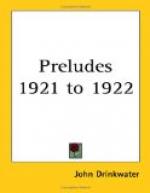.....
Since boyhood he had known Philistia
For the black thing it was, a plague opposed
Always against the loveliness of Israel,
And when his father Saul was anointed king
By Samuel in Ramah, then Jonathan knew
How all the lessons of his youth had been
To fit him for the striking of the men
Who profaned beauty and let the soul be blind.
And he was diligent in bronze and arms,
And kept his body supple, and his eye
Keen, and the coming of his hooves was thunder,
Wherever battle fell. He bore a flame,
Zealous and pure, in the heavens of his mind,
To serve and to instruct. Aye, to instruct—
There was the biting blemish, as we shall see.
.....
Philistia was foul, and Jonathan knew,
And the voice of God within him was plain and constant
To strike and strike unwearying to the end.
And then the poor, precise, infirmity
That loads good minds with ever seeming virtue,
Until they cast their treasure to the dust,
Crept on him, wound about the gleaming truth
That was his one foundation. Day by day
He was resolved, and then the grain of doubt
Would come to hurt the riding of his thought,
And break the level balance that it had.
Was then the Philistine mere black? That day
Jonathan’s arm half paused upon the blow,
And evil went a little scatheless off.
Surely the worst even of adversaries
Had somewhere beams that pointed to salvation,
And hasty judgment might not be the will
Of an all-seeing Lord? Then would the vengeance
Falter, and stay, and Jonathan’s battle failed.
And always then was bitterness and reproach
In the night watches when upon his couch
He looked on the stars studding his little window
Before sleep came. Then he would speak again
The word that single was his valiance,
His only truth, his warrant as a man,
And once again Philistia was doomed.
Then for a season clean the stroke and sure
That Jonathan drove, and black was known for black,
Till slowly as before would mount and mount
Scruple on scruple, as was not he himself
A little black sometimes, or plainly wicked?
And should the wicked man not be redeemed?
Merely destruction surely was no answer,
Since yet the wickedness must wander somewhere?
How should he say, I, Jonathan of Israel
Am good, and you the Philistine are cursed,
Since in that face was something that had been
Learnt from the buds and corn and frozen hills
That he himself had known for seals of God?
And would not his power on Israel increase,
Take on a loftier authority,
If to his famous arms he could add a tale
Of counsel working in the hearts of men,
Moving them to a finer charity,
A little pity for offence? And so
Instruction like a worm was at his roots,
And pride of virtue made Jonathan forget.
Then sometimes as he knew himself betrayed
He would cry upon his spirit in the night—




